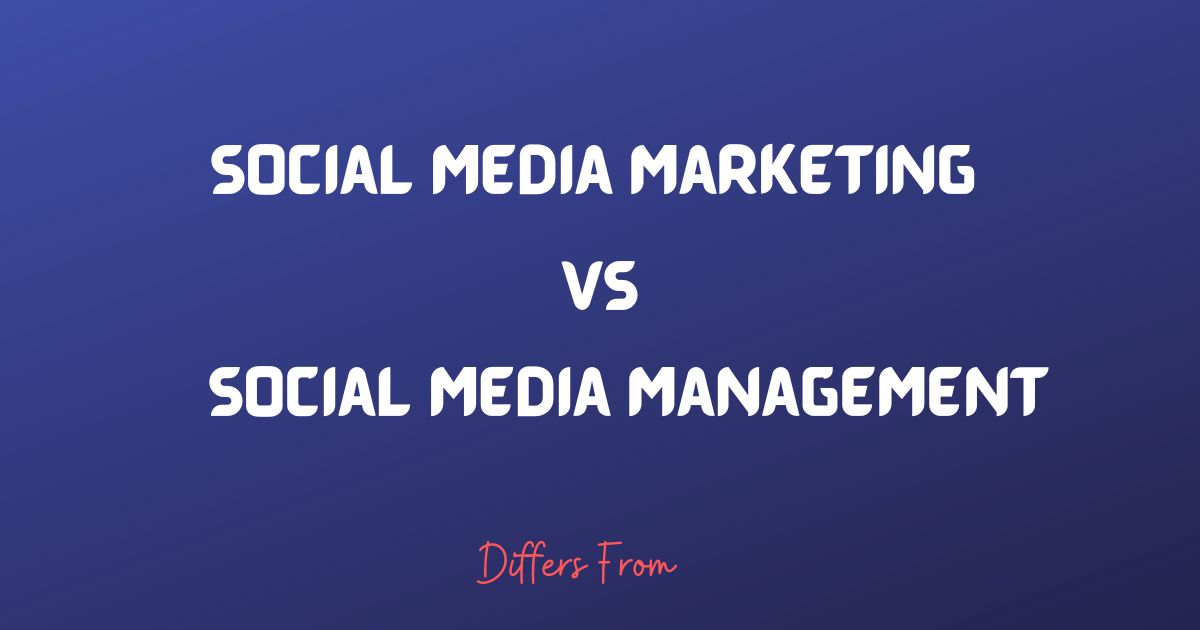In the ever-evolving world of digital communication, social media plays a vital role for businesses and individuals alike. To effectively navigate this dynamic landscape, it’s essential to understand the difference between social media marketing and social media management.
In this concise introduction, we’ll delve into the key differences between social media marketing and social media management and unravel their contributions to online engagement and brand presence.
What is social media marketing?
Social media marketing refers to using social media platforms to promote products or services, engage with the target audience, and increase brand visibility and awareness. It involves creating and sharing compelling content, running targeted advertising campaigns, and analyzing metrics to achieve marketing objectives.
Social media marketing involves promoting products, generating leads, and increasing brand awareness through targeted advertising, audience engagement, and conversion optimization.
Purpose of social media marketing
Social media marketing aims to achieve specific goals and objectives for a business using social media platforms. Social media marketing aims to leverage social platforms’ power to promote products or services, generate leads and sales, and increase brand awareness.
It allows businesses to connect with their target audience, establish a strong online presence, and drive tangible results for their marketing efforts.
Promoting Products or Services
One of the main purposes of social media marketing is to promote and showcase products or services offered by a business. It provides a platform to share information, features, benefits, and special offers to attract potential customers.
Generating Leads and Sales
Social media marketing aims to generate leads, which are potential customers interested in the products or services. Businesses can capture leads and convert them into sales by engaging with the audience through compelling content and targeted campaigns. Social media platforms often provide tools for lead generation, such as contact forms or landing pages.
Increasing Brand Awareness
Building brand awareness is another key purpose of social media marketing. It involves creating a strong online presence and making the brand visible to a wider audience. Businesses can increase brand recognition and reach by consistently sharing valuable content, engaging with followers, and leveraging social media advertising.
Focus
By focusing on advertising and promotion, targeted audience engagement, and conversion optimization, businesses can maximize the effectiveness of their social media marketing efforts. It allows them to attract the right audience, build brand awareness and loyalty, and drive measurable sales, leads, and customer engagement results.
Advertising and promotion
Social media marketing involves creating and delivering targeted advertisements to reach a specific audience segment interested in the business’s products or services. This includes sponsored posts, display ads, and video ads.
Targeted audience engagement
Businesses engage with their audience by creating relevant and valuable content that resonates with their target market. This includes posting informative articles, engaging videos, and interactive polls to foster community and encourage audience participation.
Understanding the Target Market and Target Audience is important for learning digital marketing. To learn more, read the blog on Difference between Target Market and Target Audience.
Conversion optimization
Social media marketing aims to optimize conversions by implementing A/B testing, landing page optimization, and retargeting campaigns. These tactics help businesses improve the effectiveness of their marketing efforts and drive desired actions from their audience.
What is social media management?
Social media management involves strategically planning, implementing, and monitoring an organization’s social media presence. It includes content creation, community engagement, reputation management, and analytics to ensure a consistent and effective social media strategy.
Social media management focuses on building and maintaining an online presence, engaging with the audience, and managing brand reputation. It involves content creation, community engagement, and reputation management.
Purpose of social media management
Social media management is focused on building and maintaining an online presence, engaging with the audience, and managing brand reputation. Let’s delve into the purpose of social media management in more detail:
Building and maintaining an online presence
The primary purpose of social media management is to establish and cultivate a strong online presence for a brand or business. It involves creating and optimizing social media profiles on platforms like Facebook, Instagram, Twitter, and LinkedIn.
By consistently posting relevant and engaging content, businesses can attract and retain a loyal following, expand their reach, and increase brand visibility.
Engaging with the audience
Social media management aims to foster meaningful interactions with the audience. It involves responding to comments, messages, and mentions promptly and courteously.
Businesses can build a positive brand image, establish credibility, and strengthen customer relationships by engaging with followers and addressing their inquiries or concerns.
Managing brand reputation
One crucial aspect of social media management is safeguarding and managing the brand’s reputation. This involves monitoring online conversations, addressing negative feedback or reviews, and mitigating potential crises.
By actively managing brand reputation, businesses can maintain a positive image, retain customer trust, and protect their brand from reputational harm.
Overall, social media management aims to establish a strong online presence, engage with the audience meaningfully, and safeguard and enhance the brand’s reputation.
It plays a vital role in building brand awareness, fostering customer loyalty, and creating a positive brand image in the digital landscape.
Focus
Social media management involves several critical areas of focus that contribute to effectively managing and maintaining an online presence. Let’s explore the primary areas of focus in social media management:
Content creation and scheduling
A significant focus of social media management is creating engaging and relevant content for social media platforms. This includes developing posts, images, videos, and other media that align with the brand’s messaging and resonate with the target audience.
Social media managers are also responsible for scheduling the content to ensure consistent and timely delivery.
Community engagement and customer service
Engaging with the audience is a crucial focus of social media management. Social media managers actively respond to followers’ comments, messages, and inquiries, providing helpful information, addressing concerns, and fostering positive interactions.
Businesses can build rapport, strengthen relationships, and enhance customer satisfaction by engaging with the community.
Reputation Management and crisis response
Another significant focus of social media management is managing the brand’s reputation and effectively handling potential crises. Social media managers monitor brand mentions, reviews, and discussions online to promptly address negative feedback or issues.
They also develop strategies and protocols for managing crises, ensuring a swift and appropriate response to mitigate potential damage to the brand’s reputation.
By focusing on content creation and scheduling, community engagement, customer service, reputation management, and crisis response, social media managers ensure the brand’s online presence remains positive, interactive, and aligned with the organization’s goals.
Through these key areas of focus, social media management helps businesses cultivate a loyal following, foster brand loyalty, and effectively manage their reputation in the digital space.
Difference between social media marketing and social media management
Social media management focuses on maintaining a strong presence through ongoing content creation, engagement with followers, and metrics analysis.
On the other hand, social media marketing is a more targeted approach that involves running campaigns with specific goals, such as generating leads or driving sales.
While there is some overlap in the skills required, the tools used for social media management and social media marketing are often different.
| Social media marketing | Social media management |
| Promoting products or services through social media | Maintaining a strong social media presence |
| Generate leads, drive sales | Build brand awareness, engage with followers |
| Creating and running ad campaigns, identifying target audiences, analyzing ROI | Creating and publishing content, responding to messages/comments, monitoring metrics |
| Campaign-based, with a specific start and end date | An ongoing process, usually long-term |
| Click-through rate, conversions, ROI | Followers, engagement, reach, impressions |
| Social media advertising, targeting, analytics | Social media management, content creation, customer service |
| Facebook Ads, Instagram Ads, LinkedIn Ads | Hootsuite, Buffer, Sprout Social |
In conclusion, social media marketing and management are two important components of a company’s online presence, but they serve different purposes and focus on different activities.
Social media marketing promotes products or services, generates leads and sales, and increases brand awareness. It involves creating appealing content, running paid ad campaigns, and analyzing campaign results.
The key metrics in social media marketing are conversion rates, click-through rates, and return on investment (ROI). The main goal of social media marketing is to drive business growth and achieve marketing objectives.
On the other hand, social media management focuses on building and maintaining an online presence, engaging with the audience, and managing brand reputation. It includes creating content calendars, responding to comments and messages, and monitoring brand mentions.

